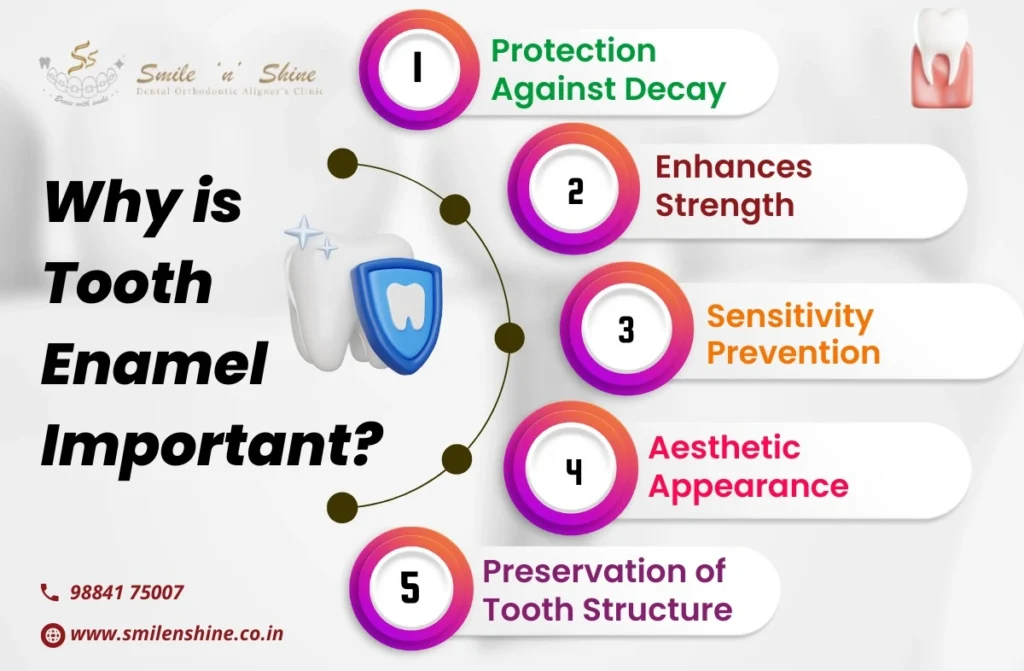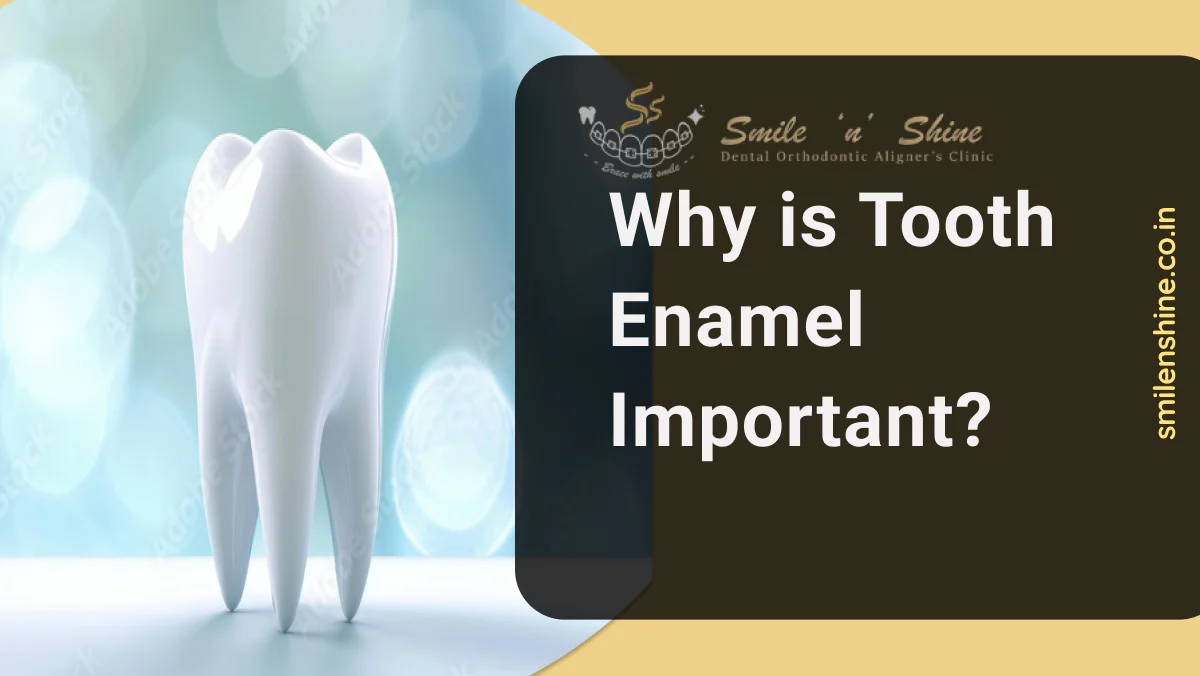Tooth enamel, the hard, outer layer of your teeth, plays a crucial role in oral health and overall well-being. This protective shell, composed primarily of hydroxyapatite, is the hardest and most mineralized substance in the human body. Despite its resilience, tooth enamel is vulnerable to various factors that can lead to its degradation. Understanding the importance of tooth enamel involves exploring its structure, functions, factors that threaten its integrity, and ways to maintain and protect it.

Structure of Tooth Enamel
Tooth enamel is primarily composed of hydroxyapatite, a crystalline calcium phosphate. This highly organized structure gives enamel its remarkable hardness, making it more resistant to wear and tear compared to other body tissues. Enamel is about 96% mineral, with the remaining 4% comprising water and organic material. This high mineral content accounts for its durability and the glossy appearance of healthy teeth.
Why is tooth enamel important? Beneath the enamel lies the dentin, a more porous and sensitive layer. The dentin is softer and contains microscopic tubules that lead to the tooth’s nerve center, the pulp. Enamel acts as a protective barrier for these underlying structures, shielding them from physical damage and bacterial invasion.
Functions & Importance of Tooth Enamel
- Protection Against Physical Damage: One amongst the primary functions of tooth enamel is protecting the teeth from physical damage. During activities such as chewing, biting, and grinding, enamel withstands significant pressure and friction. Without this protective layer, teeth would be more susceptible to chipping, cracking, and wear.
- Defense Against Bacterial Attack: The importance of tooth enamel is that it plays a crucial role in defending against bacterial attack. The mouth is home to numerous bacteria that feed on food particles and produce acids as a byproduct. These acids can erode enamel, leading to cavities (dental caries). The high mineral content of enamel makes it less permeable to these acids, providing a first line of defense against decay.
- Insulation from Temperature Changes: Tooth enamel acts as an insulator, protecting the sensitive dentin and pulp from extreme temperature changes. When consuming hot or cold foods and beverages, protecting the enamel on teeth helps to buffer the temperature fluctuations, preventing discomfort and potential damage to the tooth’s nerves.
- Aesthetic Value: Healthy enamel contributes to the appearance of a bright, white smile. One of the importance of tooth enamel is that it reflects light and gives teeth their glossy finish. When enamel is damaged or worn down, teeth can appear discolored or translucent, affecting one’s confidence and self-esteem.
Factors That Threaten Tooth Enamel
Despite the strength, tooth enamel can be compromised by various factors:
- Acidic Foods and Beverages: Why is tooth enamel important? Consuming acidic foods and drinks, such as citrus fruits, soda, and wine, can erode enamel over time. The acids in these items soften the enamel, making it more susceptible to wear and decay.
- Poor Oral Hygiene: Inadequate oral hygiene can lead to the buildup of plaque, a sticky film of bacteria that produces acids. If plaque is not removed through regular brushing and flossing, these acids can erode enamel, leading to cavities.
- Bruxism (Teeth Grinding): Grinding or clenching teeth, often during sleep, can cause significant wear on enamel. Suppose you are not aware of the importance of tooth enamel. In that case, a condition, known as bruxism, exerts excessive pressure on teeth, leading to chipping, cracking, and erosion of the enamel.
- Dry Mouth (Xerostomia): Saliva plays a crucial role in neutralizing acids and remineralizing enamel. A reduced flow of saliva, a condition known as xerostomia or dry mouth, increases the risk of enamel erosion and decay. Dry mouth can be caused by dehydration or certain medical conditions.
- Acid Reflux: Gastroesophageal reflux disease (GERD) and other conditions that cause frequent acid reflux can expose teeth to stomach acids. While considering protecting the enamel on teeth, you should know that these acids are highly corrosive and can significantly erode enamel over time.
- Sugary Foods and Drinks: Consuming foods and drinks high in sugar provides a food source for bacteria in the mouth. These bacteria produce acids as they metabolize sugar, leading to enamel erosion and cavity formation.
Maintaining and Protecting Tooth Enamel
Given the importance of tooth enamel in maintaining oral health, it is essential to take proactive steps to protect and preserve it:
- Practice Good Oral Hygiene: Brush your teeth using fluoride toothpaste. This strengthens the enamel and makes your teeth more resistant to acid attacks. Floss daily to remove plaque and food particles from between teeth, where a toothbrush may not reach.
- Limit Acidic and Sugary Foods: Reduce the consumption of acidic and sugary foods and beverages. When you do consume them, try to rinse your mouth with water afterward to help neutralize the acids. While understanding the importance of tooth enamel, it is essential to know that using a straw when drinking acidic beverages can also minimize contact with your teeth.
- Use a Mouthguard: If you grind your teeth during the night time, consider wearing a mouthguard. A dentist can provide a custom-fitted mouthguard that helps in protecting the enamel on teeth from the damaging effects of bruxism.
- Stay Hydrated: Drink plenty of water throughout the day to help maintain adequate saliva flow. Chewing sugar-free gum can also stimulate saliva production, which aids in neutralizing acids and remineralizing enamel.
- Regular Dental Check-ups: Visit your dental professional for check-ups and cleanings on a regular basis. Your dentist can detect early signs of enamel erosion and provide the importance of tooth enamel besides treatments, such as fluoride varnishes or sealants, to help protect your teeth.
- Treat Underlying Medical Conditions: If you have conditions like GERD or dry mouth, work with your healthcare provider to manage them effectively. Medications and lifestyle changes can help reduce the impact of these conditions on your oral health.
- Avoid Over-Brushing: While it is essential to maintain good oral hygiene, over-brushing or using a hard-bristled toothbrush can damage enamel. When you consider why is tooth enamel important? Ensure to use a soft-bristled toothbrush and gentle, circular motions to clean your teeth.
- Use Enamel-Protective Products: Consider using dental products designed to protect and strengthen enamel when considering the importance of tooth enamel. These may include fluoride mouth rinses, enamel-repair toothpaste, and other specialized treatments recommended by your dentist.
Conclusion
To conclude, by understanding the importance of tooth enamel and taking proactive steps to protect it, you can maintain strong, healthy teeth and a beautiful smile throughout your life. Regular dental check-ups, good oral hygiene practices, and a mindful approach to diet and lifestyle are key to preserving this essential part of your oral health.
Also Read About Invisalign Treatment in Chennai.


